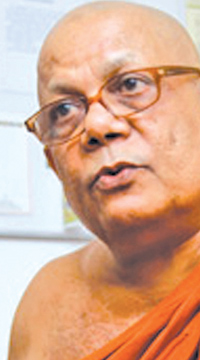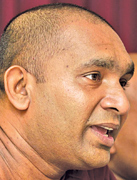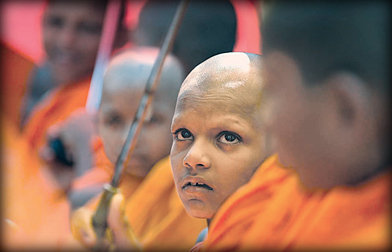|

Ven. Kirama Wimalajothi Thera Pic: Thilak Perera |
A question of conduct
Rebellious monks, lack of discipline... is the Sangha
society facing a crisis?
by Dhaneshi Yatawara
Bhikkhus have been accepted as social leaders in Sri Lanka for
centuries, with the lay community valuing their advice and guidance.
However, with the changing times, social perspectives of the modern day
bhikkhus are also changing; with many of them growing rebellious and
having no qualms about taking to the streets in vociferous protests,
confronting aggression with aggression and not afraid to throw a few
punches or receive them. Their bloodied and bruised faces may be a shock
against accepted norms, but the neoteric changes in the bhikkhu
demeanour is not exactly condoned. It is explained by their more
politically active counterparts as acceptable action under certain
circumstances.
"The aggressiveness bhikkhus show in protests is against the wayward
bureaucracy. It is not against society," says Ven. Dambara Amila Thera
of the Bhikkhu Front for Good Governance.
The Theras firmly believed that bhikkhus must get involved in
activities against injustices in society including politics and says
that being in representative democracy may not suit the bhikkhu but
should be a part of participatory democracy.
"Contesting in elections is an issue I see as against the principles
bhikkhus should follow. But definitely they should take up positions
guiding the decision makers and law makers," he adds.
"It is almost similar to a pregnant woman being blessed by a bhikkhu
which is acceptable in our culture, but he should not get involved in
the delivery of the child," the Thera says.
Bhikkhus taking the leadership of society should be an integral part
of social pressure groups that work against social injustice and
government malpractices.
Corrupt practices
"The actions should be for the benefit of the masses rather than a
privileged few and should follow the guidelines set by the Buddha," he
stresses, pointing out that after all a bhikkhu should shoulder social
responsibility.
Yet the possibility of bhikkhus getting involved in corrupt practices
is a fact that cannot be overlooked he says, urging those who become
parliamentarians should trade in their vehicle permits, discourage
issuing licences to pubs and liquor shops and get involved in resolving
the numerous malpractices with the power they are vested with as
parliamentarians or local authority members.
He says the good and the bad practices of a bhikkhu are influenced by
the environment he grew up in, and that temple, chief priest and dayakas
all matter in the creation of a disciplined bhikkhu.
|

Ven. Dambara Amila Thera Pic: ANCL Library |

Chandraprema Gamage Pic: Wimal Karunathilake |
Almost all bhikkhus enter the Sasana as children at the age of 11 or
12. "At this age a child has no idea of discipline or anything related
to it. But the environment in which he spends the rest of his formative
years and where he grows up to be an adult greatly influences the person
he is going to be in the future," he says. Despite all these facts, the
Sangha society of today seems to ignore the disciplinary violations by
bhikkhus and society does not witness any action taken against them by
any of the Nikayas in Sri Lanka.
Conduct
"The problem is that the Sri Lanka Sangha society does not have a
centralised administrative body to look into these matters. Each Nikaya
follows their own rules, of course mostly on the principles laid by
Buddha, but it is inefficient," he adds.On a more positive note, the
Thera says due to continuous pressure from intellectuals, Buddhist
social groups and academics from both the lay and the bhikkhu community,
the government is taking steps to resolve the disciplinary issues
regarding bhikkhus.
Meanwhile, the Commissioner General of Buddhist Affairs, Chandraprema
Gamage says the government is taking steps to implement an Act to
register the different views on discipline and the various aspects
concerning a bhikkhu's conduct in the three Nikayas.
"The government will act only as a facilitator. The decision-making
bodies of the Nikayas should take the final decision, and the government
under the provisions of the Act will register the suggestions and the
action recommended. If any of the Nikayas stipulate disciplinary action
against any bhikkhu and if the action is not followed, the Government
can intervene according to the provisions provided within the Act," he
explains. The draft of the Act was handed over to the Attorney General's
Department a few weeks ago and it is now under evaluation.
 According to Gamage, the Ministry of Buddhist Affairs should table the Bill in
Parliament soon.In response to the question as to whether the Sangha
society is facing a crisis, when people criticize bhikkhus as being less
disciplined than laymen, Ven. Kirama Wimalajothi Thera said that the
main cause is lack of a disciplined education for bhikkhus. "For an
ordinary mother and a father, offering a child to the Buddha Sasana is
the most meritorious act. If the Samaneras turn out be indisciplined
bhikkhus, would it not break the hearts of those parents?" queried the
Thera. According to Gamage, the Ministry of Buddhist Affairs should table the Bill in
Parliament soon.In response to the question as to whether the Sangha
society is facing a crisis, when people criticize bhikkhus as being less
disciplined than laymen, Ven. Kirama Wimalajothi Thera said that the
main cause is lack of a disciplined education for bhikkhus. "For an
ordinary mother and a father, offering a child to the Buddha Sasana is
the most meritorious act. If the Samaneras turn out be indisciplined
bhikkhus, would it not break the hearts of those parents?" queried the
Thera.
"Before the early 1970s, there was solid education at Pirivenas that
moulded the character of bhikkhus. They were ordained, not just
physically but also spiritually," Ven. Wimalajothi Thera says the
education and training at Pirivenas for the duration of about 10 years
made a big impact on the spiritual life of the bhikkhu, and a genuine
bhikkhu who was true to Buddhism was produced. The Vidyodaya and
Vidyalankara Pirivenas played a pivotal role in this connection. When
the Pirivenas were converted to universities, young bhikkhus got
entangled with the material world and the political controversies of the
lay world," he said.
"Thus, all these corrupt factors filled their minds with hatred and
anger, instead of instilling peace and loving kindness. Today, we see
the ultimate result," he said.
"Bhikkhus should practise self-discipline before advising leaders and
communities," the Thera emphasises. |

